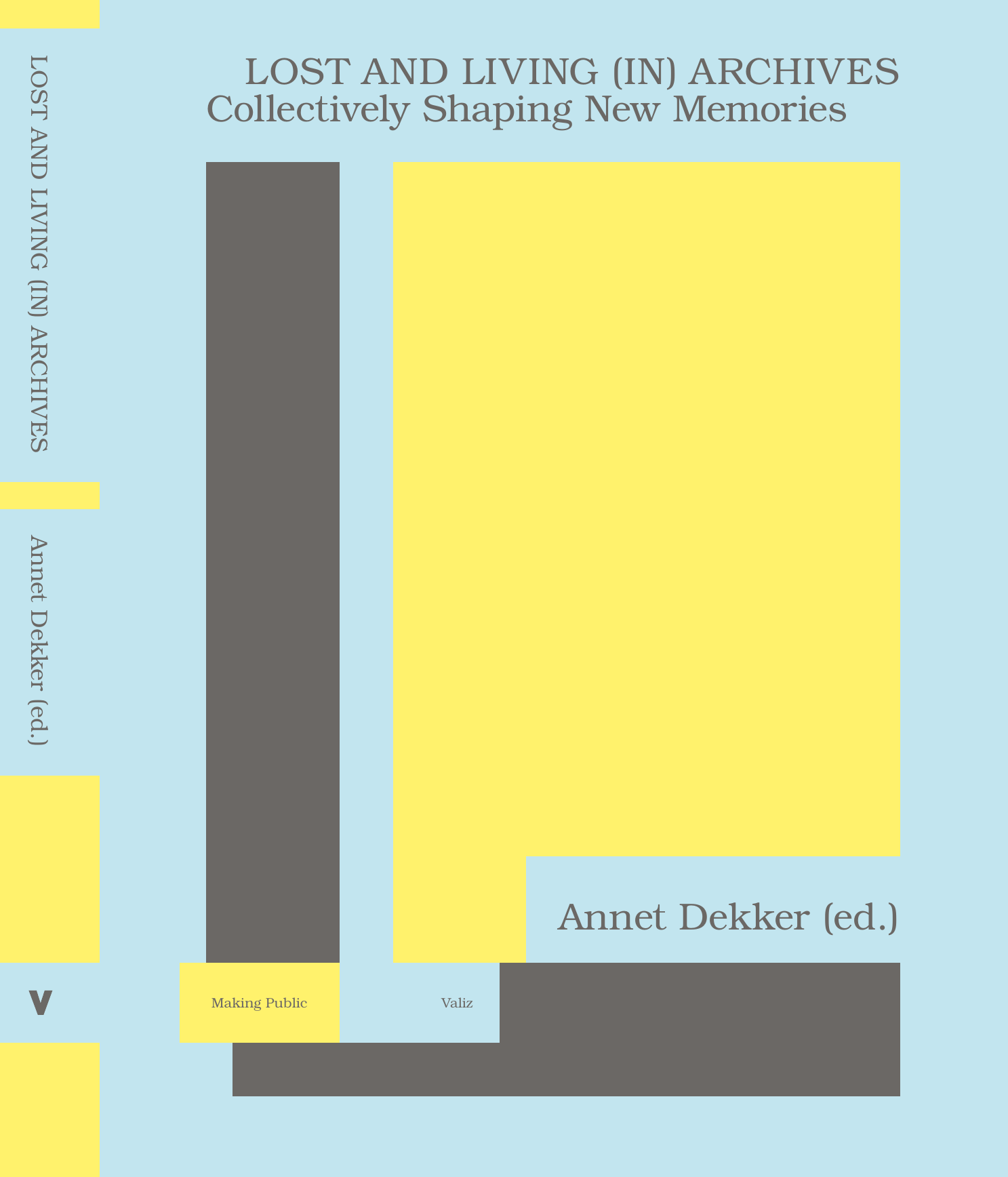Annet Dekker (ed.): Lost and Living (in) Archives: Collectively Shaping New Memories (2017)
Filed under book | Tags: · activism, archive, archiving, art, collectivism, digital media, documentation, internet, living archive, media, media activism, media culture, memory, web
“Archives are collections of records that are preserved for historical, cultural and evidentiary purposes. As such, archives are considered as sites of a past, places that contain traces of a collective memory of a nation, a people or a group. Digital archives have changed from stable entities into flexible systems, at times referred to with the term ‘Living Archives’. In which ways has this change affected our relationship to the past? Will the erased, forgotten and neglected be redeemed, and new memories be allowed? Will the fictional versus factual mode of archiving offer the democracy that the public domain implies, or is it another way for public instruments of power to operate? Lost and Living (in) Archives shows that archives are not simply a recording, a reflection, or an image of an event, but that they shape the event itself and thus influence the past, present and future.
Contributors: Babak Afrassiabi, Dušan Barok, Tina Bastajian, Nanna Bonde Thylstrup, Özge Çelikaslan, Annet Dekker, Olia Lialina, Manu Luksch, Nicolas Malevé, Aymeric Mansoux, Michael Murtaugh, Josien Pieterse, Ellef Prestsæter, Robert Sakrowski, Stef Scagliola, Katrina Sluis, Femke Snelting, Igor Štromajer, Nasrin Tabatabai.”
Publisher Pia Pol, Valiz, Amsterdam, 2017
Making Public series
Creative Commons BY-NC-ND 3.0 NL License
ISBN 9789492095268, 9492095262
285 pages
Reviews: Alessandro Ludovico (Neural, 2018), Natacha Yahi (Critique d’art, 2019, EN/FR).
PDF (16 MB)
Comment (0)FIELD, 12/13: Art, Anti-Globalism, and the Neo-Authoritarian Turn (2019)
Filed under journal | Tags: · activism, alt-right, art, art criticism, authoritarianism, far right, politics, populism, protest, social movements

This special issue of FIELD: A Journal of Socially-Engaged Art Criticism focusses on “new forms of cultural and artistic activism that have emerged in response to the global rise of right wing populist and authoritarian forms of government. It features over thirty essays by leading artists, activists, historians, critics and curators who share a commitment to freedom of expression, economic equality, environmental justice, individual identity and mobility, and the expansion of democratic processes.”
Edited by Greg Sholette
Publisher Department of Visual Arts, University of California, San Diego, Winter/Spring 2019
Open access
State Machines: Reflections and Actions at the Edge of Digital Citizenship, Finance, and Art (2019)
Filed under book | Tags: · activism, art, citizenship, finance, technology, theory

“Today, we live in a world where every time we turn on our smartphones, we are inextricably tied by data, laws and flowing bytes to different countries. A world in which personal expressions are framed and mediated by digital platforms, and where new kinds of currencies, financial exchange and even labor bypass corporations and governments. Simultaneously, the same technologies increase governmental powers of surveillance, allow corporations to extract ever more complex working arrangements and do little to slow the construction of actual walls along actual borders. On the one hand, the agency of individuals and groups is starting to approach that of nation states; on the other, our mobility and hard-won rights are under threat. What tools do we need to understand this world, and how can art assist in envisioning and enacting other possible futures?”
Contributors: James Bridle, Max Dovey, Marc Garrett, Valeria Graziano, Max Haiven, Lynn Hershman Leeson, Francis Hunger, Helen Kaplinsky, Marcell Mars, Tomislav Medak, Rob Myers, Emily van der Nagel, Rachel O’Dwyer, Lídia Pereira, Rebecca L. Stein, Cassie Thornton, Paul Vanouse, Patricia de Vries, Krystian Woznicki.
Edited by Yiannis Colakides, Marc Garrett, and Inte Gloerich
Publisher Institute of Network Cultures, Amsterdam, 2019
Creative Commons BY-NC-SA 4.0 License
ISBN 9789492302335
260 pages
PDF, PDF (59 MB, updated on 2022-11-14)
EPUB (39 MB)


